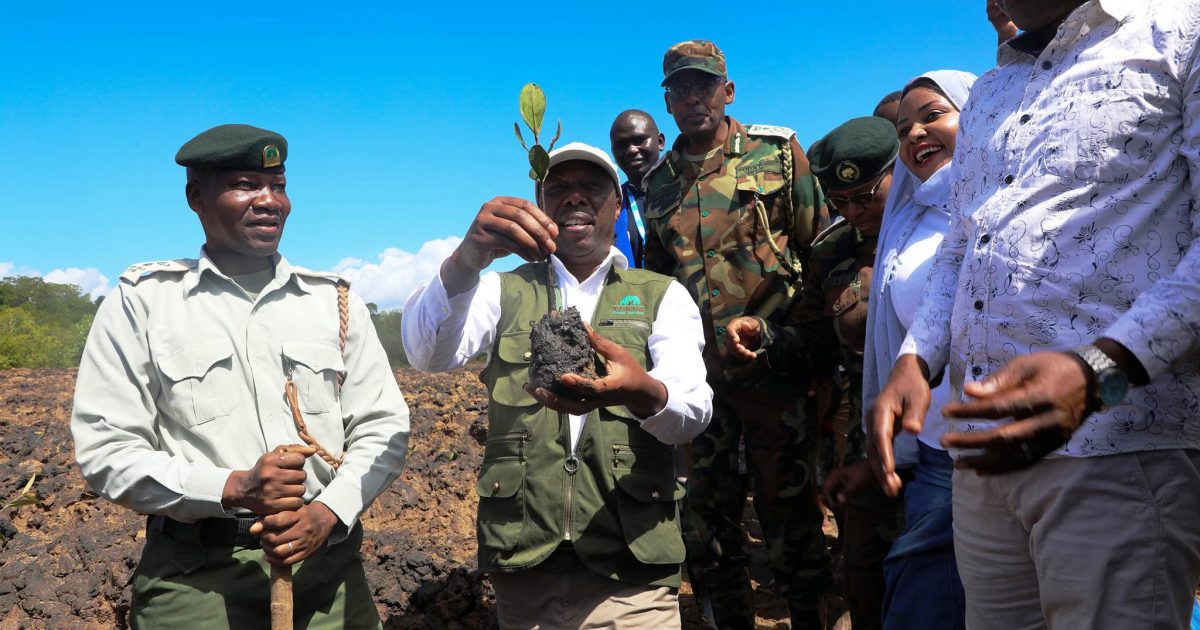The government is committed to the rehabilitation and restoration of mangrove ecosystems in a bid to save biodiversity and the livelihoods of coastal communities.
Mangrove forests provide habitat for thousands of species at all levels of marine and forest food webs and also protect both the saltwater and freshwater ecosystems they straddle.
State Department for Forestry Principal Secretary Mr. Gitonga Mugambi said the goal is to support the country’s biodiversity, support communities to build sustainable livelihoods, and reduce the overexploitation of mangroves.
Mugambi said mangroves serve as buffers between land and sea, protect against climate change, and act as effective carbon sinks by absorbing carbon dioxide from the atmosphere.
The PS, who was speaking at Mwenjeni village and Buda forest station in Kwale County during national celebrations to mark the International Day for the Conservation of the Mangrove Ecosystem, said protection of the remaining mangrove forests and restoration of destroyed or degraded areas through afforestation and reforestation are essential.
Mugambi said urgent concerted efforts are needed to save the unique mangrove forests before they are completely damaged and to save the biodiversity and livelihoods that depend on the mangroves.
“We are committed to taking strong measures to protect these sea forests that also support aquaculture from climate change and human activities,” he said, adding that the mangrove ecosystem offers great resilience to climate change impacts.
The PS underscored the importance of mangrove conservation in the fight against climate change and protecting coastal communities against erosion, sea-level rise, and storm surges.
The International Day for the Conservation of the Mangrove Ecosystem is celebrated every year on July 26 and aims to raise awareness of the importance of mangrove ecosystems as “a unique, special, and vulnerable ecosystem” and to promote solutions for their sustainable management, conservation, and uses. This year’s theme is ‘Forests and Livelihoods: Sustaining People and Planet’.
Globally, mangrove forests have been exploited, degraded and destroyed mainly by human activity like cutting for timber, fuel, and charcoal, land development near the ocean, urbanisation, pollution, and, more recently, climate change impacts.
The PS said the day seeks to raise awareness about the importance of self-sustaining mangrove ecosystems found along the coastlines of Mombasa, Kwale, Kilifi, and Lamu.
Mugambi called on the mangrove communities to plant trees in an effort to rehabilitate forests and in line with the government’s agenda to plant five billion trees in the next five years.
He noted that the government targets to grow over 300 million trees in the next ten years in Kwale alone to contribute to the achievement of 30 per cent tree cover by 2032.
He stated that the government has made a commitment to reclaim, rehabilitate, and conserve all the wetlands, water catchment areas, and other degraded forest landscapes across the country.
“Over the next ten years, we shall grow 15 billion trees and restore 10.6 million hectares of our degraded forests and rangelands, including mangroves,” he said.
The PS said the Kenya Forest Service will lead efforts in rehabilitating degraded mangrove areas through hydrological restoration and the planting of new mangroves.
Experts contend that mangroves are threatened by overharvesting, land use change (conversions), and more recently, climate change through flooding and coastal and marine sedimentation.
The experts say the wanton destruction of mangrove forests will inevitably lead to the destruction of coral reefs and decreasing fish populations.
The event was attended by area Governor Fatuma Achani, Senator Issa Boi, Msambweni MP Mr. Feisal Bader, Lunga Lunga MP Mr. Mangale Chiforomodo, County Commissioner Mr. Meru Mwangi, the Office of the Governor’s Spouse Chief Executive Officer Dr. John Chumo, and Chairman of the Kenya Forest Service Board Mr. Job Chirchir.
Governor Achani said there is an urgent need for the rehabilitation of the mangrove ecosystem to be stepped up if they are to continue to render services to the county and country.
She has reiterated her administration’s commitment to restoring mangroves in the county to improve lives in the communities. “Mangroves are not just ecologically significant but are critical to the livelihood and food security of coastal communities,” she said.
Achani noted that the degradation of pristine mangroves caused by various human activities needs to be tackled with utmost urgency by all stakeholders.
“As a devolved government, we are at the forefront of planting mangroves along the shoreline as one of the remedies for curbing adverse climatic changes,” said Achani, adding that the county seeks to improve coastal sustainability by increasing mangrove cover.
She said rehabilitating mangrove ecosystems would improve the livelihood of local communities and enhance sea defences by providing security from natural hazards.
Achani said an initiative to restore and plant new mangrove forests is proving an interesting way of contributing to carbon sequestration through reforestation and forest preservation.
On his part, Chirchir said mangrove ecosystems provide shoreline protection from climate-related and other disasters such as storms and tsunamis and reduce flood risks, inundation, and erosion.
“They also help in mitigating the impact of climate change as they store a significant amount of carbon,” he said.
By Hussein Abdullahi





